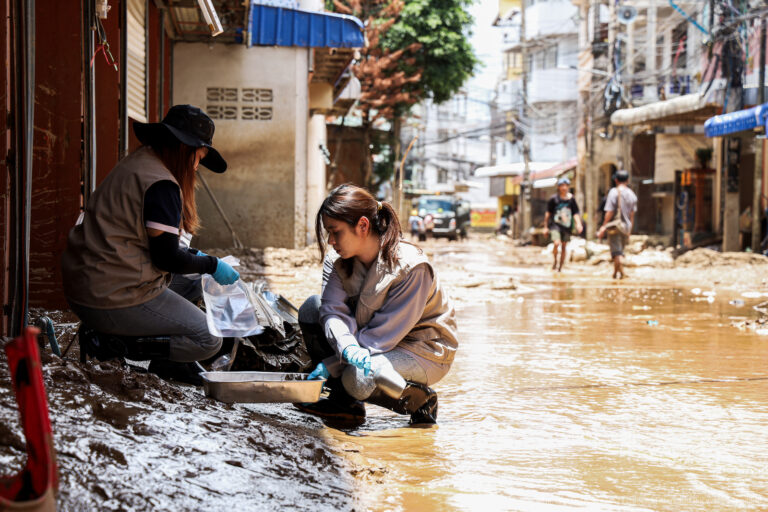CHIANG RAI, Thailand — Just days before the water fights were set to erupt across Chiang Rai for Songkran — Thailand’s New Year celebration, held every April and known for its festive street soakings — the city’s residents received a sobering warning: avoid contact with the Kok River, which winds through this northern Thai city of 200,000. The reason? Tests conducted upstream had detected dangerous levels of arsenic and other hazardous substances. The alarm had first been raised the previous month, when people living near and across the border in Myanmar, where the 285-kilometer (177-mile) Kok River originates, reported skin rashes after bathing, elephants showing signs of illness, and fish turning up dead in the water. Just as communities prepared to celebrate renewal and rebirth, their most important river was declared off-limits. Reports of skin rashes and fish kills in the Kok River prompted both officials and activists to conduct tests of the river water. Image courtesy of Ecological Alert and Recovery–Thailand. Since then, the situation has grown even more dire. Follow-up testing in both the Kok and the nearby Sai rivers has revealed widespread contamination , especially close to the Thai-Myanmar border. Most sampling sites have shown arsenic levels far above safety standards, and in some areas the water has turned an unsettling orange-yellow hue. Perhaps even more alarming, elevated arsenic levels have also been found in the Mekong River, which is fed by both the Kok and Sai rivers. Tests at two sampling points in the Mekong showed…This article was originally published on Mongabay
Search
Recent Research
Want your Blog Article featured on our website?
Research
Featured News
Explaining Katsina’s Massive Leap to 2nd Position in the 2025 Climate Governance Ranking
In 2024, during the first edition of the Subnational Climate Governance Performance Rating and Ranking,
COP30: Firm to connect institutions with international climate finance opportunities
SISTME, a climate change and biodiversity conservation consulting firm based in Argentina, has offered to
From resistance to planetary governance, Indigenous women redefine global climate action
While world leaders negotiate behind closed doors in the Blue Zone of COP30, Indigenous Women
Sahara Group Foundation launches 16th Sahara Go Recycling Hub to boost environmental sustainability, economic empowerment
Sahara Group Foundation, the corporate social impact arm of Sahara Group, has commissioned its 16th
Climate finance is the lifeblood of climate action – Simon Stiell at COP30
Remarks delivered by UN Climate Change Executive Secretary, Simon Stiell, at the third High-Level Ministerial
UNDP, REA, GEF commission Plateau solar mini-grid to power agricultural value chains, empower rural communities
The United Nations Development Programme (UNDP), in partnership with the Rural Electrification Agency (REA) and
COP30: Africa urges world leaders to turn pledges into action
Africa has called on the world leaders to turn their pledges into action regarding the
Thousands join global marches calling on govts at COP30 to deliver climate justice
An estimated 30,000 people marched through the Brazilian city of Belém on Saturday, November 15,


